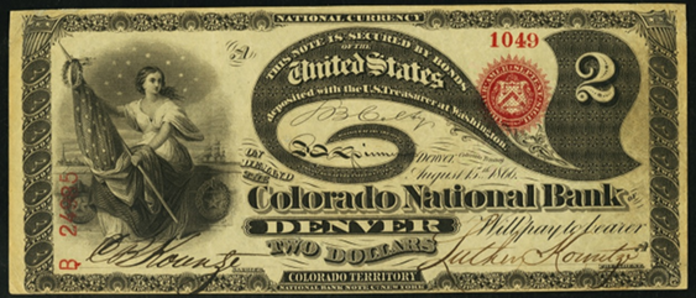Two Dollar Notes › Nationals › 1863 Two Dollar Original Series National Bank Notes › Vermont Charters › 1863 $2 Waterbury Vermont Waterbury National Bank
Get Value Now
| Item | Info |
|---|---|
| Series | 1863 |
| Charter | #1462 Waterbury National Bank of Waterbury, Vermont |
| Year Chartered | 1865, 944 Banks Chartered |
| City Info | Waterbury is a town in Washington County in central Vermont, United States. It is also the name of a village within that town. The population of the town was 5,064 at the 2010 census. The location where Waterbury now lies was once the frontier between the Mahican and Pennacook people. European settlement of the area dates from 1763, when King George III granted a charter for land in the Winooski River valley. James Marsh became the first permanent white settler in the region in 1783. Many of the early settlers came from Waterbury, Connecticut, and named their new town in honor of the hometown. The village of Waterbury was incorporated in 1882 with a population of over 2,000. Source: Wikipedia |
| Similar Cities | If your note doesn't match try: 1. Waterbury, Connecticut - Waterbury National Bank 2. Waterbury, Connecticut - Citizens National Bank |
| Seal Varieties | Red with rays |
| See Also | If your note doesn't match try: 1. 1862 $2 Legal Tender 2. 1869 $2 Legal Tender |
| Other Info | 1. Value depends on notes known for charter, condition and market demand. |
| Neat Fact | Notes from common charters are less valuable compared to rarer charters. Value also depends on type, denomination and total notes known for city, state and region. Ultimate determination of value is collector demand. |
No Obligations Offers and Appraisals
Please submit a good photo or scan. It will be identified and evaluated. Understand there may be subtle differences between the image you see above and your note. Signatures, design, markings and note condition will determine the offer price. Notes in Uncirculated or better condition receive the best offers.
Appraisals can be estimated for wholesale and retail prices. Wholesale is what dealers typically pay. Retail is what a collector might pay. Retail is slightly higher in most cases.
Please visit this page for USA Paper Money Reference. Do not treat this page as a reference guide, it is for appraisal and acquisition purposes only.
